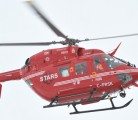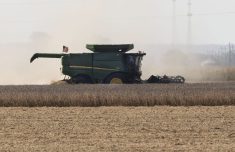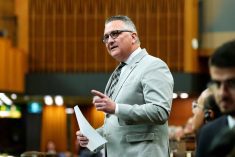Carrie Derin tells a matter-of-fact story about the day that could have ended her life.
That she’s telling it at all is a credit to the Shock Trauma Air Rescue Society (STARS), she says.
“I don’t believe I would have made that trip from Moose Mountain (Provincial Park) to the city or be talking to you in the same capacity I am today,” the Regina woman said recently.
Derin, her husband and two daughters were operating all-terrain vehicles in the southeastern Saskatchewan park Aug. 31, 2012.

“I was driving down a logging road,” she said. “A beaver had fallen a tree and it was propped up and I didn’t see it. I ran into the tree and it came through the front of my quad.”
The tree pierced her abdomen and impaled her against the seat.
Her husband raced off to get help, leaving a conscious Derin with her two daughters, then 10 and 15.
“I do (remember),” she said of the time they spent waiting. “It seemed to take forever, but the girls were great and they were my strength.”
A first responder from the park arrived with her husband, and then an ambulance team took her to a place where the STARS helicopter could land.
Read Also

Alberta harvest wrapping up: report
Harvest operations advanced to 96 per cent complete in Alberta as of Oct. 7, with only a few late-seeded cereal and canola fields remaining, according to the latest provincial crop report.
Derin was in critical condition, but still conscious, and the helicopter landed briefly at the Arcola Hospital for a two-minute stop to pick up blood for a transfusion. She was at Regina Hospital in about 40 minutes and spent a couple of weeks there recovering from a lacerated liver, damage to her diaphragm, shattered ribs and extensive blood loss.
“I was aware of STARS but never ever thought I’d need them,” she said April 29 while marking the one-year anniversary of the helicopter ambulance’s service in the province.
The Regina services, STAR-9, launched April 30, 2012, and flew its first mission the next day.
Saskatoon service, or STAR-11, began Oct. 15, 2012, and flew its first mission less than an hour later.
Both bases now provide service 24 hours a day, seven days a week. In the past year they have flown 370 missions and transported or cared for more than 250 patients.
Provincial health minister Dustin Duncan was recently at a celebration at the Regina base when a call came in. He took to social media to express his admiration for how quickly the crew jumped into action, calling it “incredibly impressive” and “overwhelming.”
Derin visited the Regina base in November to thank the crew that saved her life. She is considered a STARS VIP, or very important patient, and stopped at the Regina legislative building last week with another flight crew as part of the one-year celebration.
The provincial government financially supports STARS, a not-for-profit organization that also relies on corporate donations and fundraising. The province contributes $10.5 million per year to its operation.
This year the health ministry is building a $3.4 million helipad on the roof of Regina General.
Derin said all Saskatchewan residents should be thankful STARS is operating in the province.
She counts herself lucky and said the effects of her accident are few.
“With the exception of a little bit of stiffness and a few missing ribs, I feel great,” she said.


















